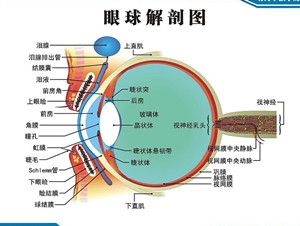(单词翻译:单击)

Don: Say you're looking at an object on a table in front of you. How long do you think your eyeballs stay in one position?
看你一直在看你面前那张桌上的东西。你眼球能持续盯在一个地方多长时间?
Yael: You mean, how long before they move? I'm going to guess... a minute.
你的意思是,眼球能保持多长时间不动?我想……一分钟吧。
D: More like less than a second.
更像是不到一秒钟。
Y: Yow!
哎唷!
D: Though we feel as if our eyes stay completely still when we focus on something, researchers have found they only stay still at most for a couple seconds--often just a few milliseconds. What's fascinating about this is that every time our eyes move, we are momentarily visually impaired. We aren't seeing anything but a blur. So if we're always moving our eyeballs, and are always impaired, why don't we experience the world as a confusing rush?
虽然我们感觉我们在一直盯着某物看,但研究者发现,我们甚至至多只保持了几秒钟——往往是几毫秒。有意思的是,实际上当每次我们的眼睛转动的时候,我们会有短时的视觉失效。
我们看到的就是一片模糊。所以如果我们总是移动眼珠,视力总被削弱,那为什么我们没感觉世界是一片混乱的呢?
Y: I bet you have an answer.
我赌你有答案。
D: Researchers at the University of Delaware have a good guess. They have done studies that show the brain is always extending the boundaries of what it sees-- adding in made-up information along the edges. This process is called "boundary extension," and it seems to be going on all the time. Say you're looking at a brick wall. You really only see a small section of it, but your visual processing system essentially says, "I can assume that beyond my visual field on either side are more red bricks, so for now I'll just add them in until I get better information." That process of
constantly extrapolating on what you see may be what allows you to experience a calm and consistent visual world, even though the actual data coming in is much more fragmented.
特拉华大学的研究人员有个很好的猜想。他们所做的研究表明,大脑总是人为扩充我们的视野范围——添加一些凭空捏造的东西。此过程称为“边界扩展”,而且一直进行着。就拿你看着砌墙来说。你只是看到了一小部分,但你的视觉处理系统会告诉你,“我视线之外的一边会有更多的红砖头,那么我就会一直给自己输入这种信息直到我真的看到那一边到底有什么为止。”在对你可能看到的事物进行持续的推断过程中,你感觉到世界是平静、持续不变的,即使实际接收到的信息是片断式的。


